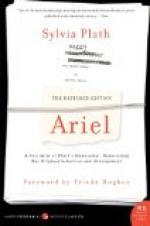|
This section contains 869 words (approx. 3 pages at 300 words per page) |

|
The poems in Ariel have succeeded almost too well. Their restless intelligence and agonizing, ordered intensity have marked them too tellingly. They are now in danger of becoming an anomaly instead of taking their place in a romantic, imagistic tradition extending back and beyond the official Romantic poets to [Christopher] Smart and [William] Blake and [John] Clare. A respect for the particular otherness of things and for the peculiar joy of the visionary moment places Sylvia Plath in a long line of poets often wrongly separated into romantic and unromantic camps: [William Butler] Yeats and Eliot, [Theodore] Roethke and Elizabeth Bishop, [Dylan] Thomas and Marianne Moore.
Yet, Sylvia Plath's curiosity and hunger for experience are continually transformed in her poems from a romantic poetry of observation into a poetry of annihilation and transcendence. Her poems strive toward a state of purity. (p. 66)
Sylvia Plath presents us with poems...
|
This section contains 869 words (approx. 3 pages at 300 words per page) |

|


